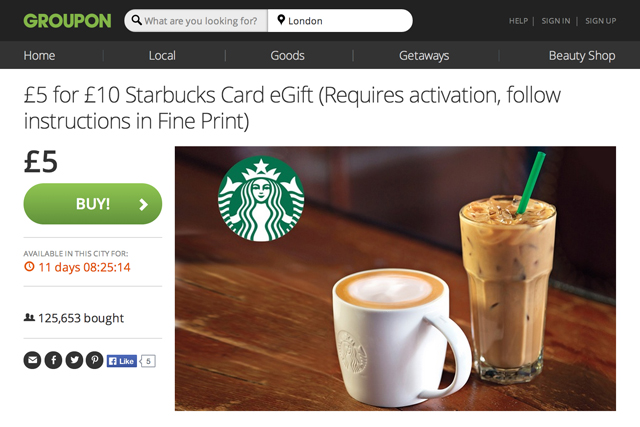In the age of discounting, buying something at full-price is an anomaly. The search for a bargain is so embedded in post-recession Britain that some consumers would think nothing of whipping out a discount voucher on a first date.
In the four years since Groupon launched in the UK, the market has changed irrevocably. Heavy discounting has become the wallpaper of everyday life; where once the UK shunned the coupon culture so beloved in the US, heavy discounting is now the norm.
But in an era where some consumers believe it is acceptable to whip out a discount voucher on any given opportunity, even a first date, it is not surprising that discount fatigue has set in.
However, Tamer Tamar, senior vice president at Groupon EMEA, does not agree that discount fatigue is an issue: "Everyone is looking for a deal and a good deal sells like bread and butter. Deal fatigue exists in terms of the time that consumers are willing to invest in looking for a deal, but the desire for a deal remains."
A question of credibility
In the age of heavy discounting there is no doubt that not only have brands become over-reliant on discounts, but have been economical with the truth when it comes to just how groundbreaking these discounts are.
In an era where consumers believe it is acceptable to whip out a voucher on a first date, it is not surprising that discount fatigue has set in.
It as if the web is a high street store that has been admonishing consumers to "hurry while stocks last" in a closing down sale that started in 2010. Fast forward to 2014 and Groupon faces a far header sell to consumers.
Groupon’s share price suggests that a shift in strategy is necessary in order to meet this challenge. The discount giant went public in 2011, but the shares have lost 70% since the IPO.
The brand is attempting to shift its strategy towards selling more discounted physical goods and hopes to become a major ecommerce player. In line with this strategy, Groupon is relaunching its UK website and shifting its focus to apps, with relaunched versions of its android and iphone apps launching today.
Beyond email
The move marks a shift away from Groupon’s daily email deals and heavy reliance on push marketing. "What consumers want is greater targeting with more relevance," explains Tamar. "The beauty of our focus on apps and relaunched website is it allows us to engage more with consumers outside the mechanics of an individual deal."
The brand will roll out curated collections of deals as well as launching Market Picks, a partnership with Expedia to deliver thousands of discounted hotel deals worldwide. "Heavy discounting alone is not enough. When people come to the site they want to find a discount quickly; relevance is important," saysTamar.
Finite resources: time and money
Groupon faces an uphill battle in establishing itself as a shopping destination outside the excitement generated by individual deals.
 In such a price sensitive market, consumers have little to no loyalty. However, Tamar (right) points out that Groupon apps have been downloaded more than 80 million times in 43 countries worldwide.
In such a price sensitive market, consumers have little to no loyalty. However, Tamar (right) points out that Groupon apps have been downloaded more than 80 million times in 43 countries worldwide.
"People find a lot of joy in getting a deal and it isn’t about how wealthy they are. Consumers want to find what they want quickly and we need them to understand as an online marketplace we can deliver it," he says.
While the customer service element in Groupon deals may not be frictionless, Tamar believes that there is always a trade-off with any discount purchase and a trade off consumers are willing to make: "Success depends on what is credible. On Groupon you see the price and when you compare elsewhere it isn’t cheaper. We are not offering empty promises."
In the age of discounting, it is not the brands that shout the loudest, but those that provide goods and services at the cheapest price that will win. While improvements in technology mean that the discount voucher at the dinner table may well be past its use-by-date, the consumer behaviour behind it remains.


